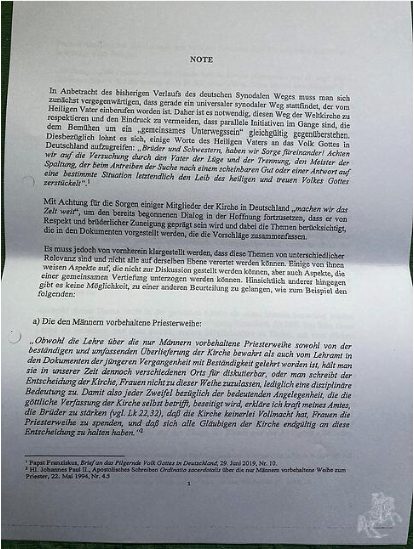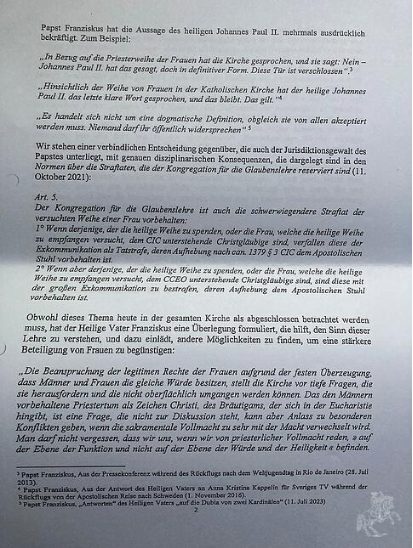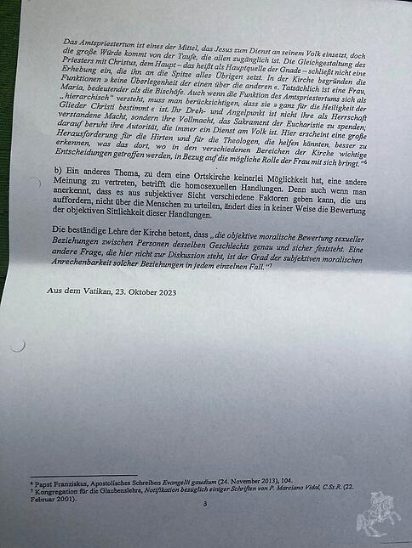(ZENIT News / Rome, 23.11.2023).- In a significant turn in relations between the Vatican and the German Catholic Church, the Pope’s Secretary of State, Cardinal Pietro Parolin, sent a clear message to the German Bishops: There will be no negotiation on the exclusion of women from priestly Ordination or on the Doctrine of the Church regarding homosexuality. This pronouncement was made known in a letter dated October 23, addressed to the General Secretary of the German Bishops, Beate Gilles.
The letter details the procedure and content of a forthcoming round of German-Roman dialogue in the framework of the so-called [German] Synodal Way, which has been the object of discussion and debate in ecclesiastical circles for several months. The Vatican’s position seems to be clear: certain aspects of Doctrine are not subject to change and will not be discussed in the planned conversations.
This message is added to a series of meetings that were held this year between Representatives of Vatican Dicasteries and the German Bishops. In July, the first meeting was held to address the Synodal Way, which was followed by a meeting in October with the German participants in the World Synod. Among them were Monsignor Georg Bätzing, Monsignor Felix Genn, Monsignor Bertram Meier, Monsignor Stefan Oster and Monsignor Franz-Josef Overbeck, as well as the General Secretary of the German Episcopal Conference, Beate Gilles.
These conversations, far from being exhausted, will continue up to next year. In 2024, the Heads of the Dicasteries for the Doctrine of the Faith, for Promoting Christian Unity, for Bishops, for Divine Worship and the Discipline of the Sacraments and for Legislative Texts are planning to meet with Representatives of the German Bishops on three occasions: in January, in April and in June.
The topics to be discussed are crucial and encompass areas such as Ecclesiology, Anthropology, Morality and Liturgy. Addressed in addition will be pertinent texts of the Synodal Way, a process that has sought substantial reforms in the German Church. The Note of the Vatican Secretariat of State, translated into English, serves as a basis for the forthcoming discussions in the Vatican and is known by all the German Episcopate.
In keeping its firm position on certain doctrinal aspects, the Vatican poses a theological challenged to the German Church, marking a milestone in the dialogue process, which could have lasting repercussions in the Catholic Church.
Here is the Note, translated into English.
* * *
Note of the Secretariat of State of October 23, 2023
In view of the unfolding of the German Synodal Way to date, one must be aware, in the first place, that at present a Universal Synodal Path is being carried out, called by the Holy Father. Hence, it is necessary to respect this Path of the universal Church and avoid the impression that parallel initiatives are being carried out, [which are] indifferent to the effort to “walk together.” In this connection, it is worthwhile to take up again words of the Holy Father to the People of God in Germany: “Brothers and Sisters, let us take care of one another! Let us guard against the temptation of the Father of Lies and of division, of the master of schism that, fostering the quest for an apparent good or an answer to a particular situation, ends by dismembering the holy and faithful body of the People of God” (1).
Respecting the concerns of some members of the Church in Germany, we “extend the tent” to continue the dialogue already initiated, with the hope that it is marked by fraternal respect and affection, taking into account the topics presented in the documents that summarize the proposals.
However, it must be made clear from the beginning that these topics are of different relevance and cannot all be localized at the same level. Some of them have aspects that cannot be debated, but also aspects that can be the object of an in-depth joint debate. In regard to others, however, there is no possibility to come to a different judgment, such as the following:

(a)Priestly Ordination Reserved to Men:
“Although the Doctrine of Priestly Ordination reserved solely to men has been both preserved by the constant and broad Tradition of the Church as well as taught by the Magisterium in documents of the recent past, yet it is regarded as discussible in our time in different places, considering the decision of the Church not to admit women to this Ordination as a merely disciplinary measure. Hence, in order to dissipate any doubt on this important question, which concerns the divine constitution of the Church herself, I declare, in virtue of my office to strengthen the brethren (cf. Luke 22:32), that the Church does not have the authority to ordain women to the priesthood and that all the faithful of the Church must abide, definitively, by this decision” (2).
Pope Francis has reaffirmed explicitly on various occasions Saint John Paul II’s declaration. For example:
“With regard to the Ordination of women to the priesthood, the Church has spoken and says: No, John Paul II said it, but in definitive terms. This door is closed” (3).
“In regard to the Ordination of women in the Catholic Church, Saint John Paul II said the last clear word, and that remains. That is valid: (4).
“It is not a dogmatic definition, although it must be accepted by all. No one can contradict it publicly” (5).
We are before a binding decision, which is also subject to the jurisdictional power of the Pope, with precise disciplinary consequences, which are included in the rules on infractions reserved to the Congregation for the Doctrine of the Faith (October 11, 2021):
Art. 5.
The Congregation for the Doctrine of the Faith reserves to itself also the most serious crime of attempted consecration of women:
1st If the person who attempts to confer sacred Ordination or the woman that attempts to receive sacred Ordination are believers in Christ subject to the CCC, they are subject to excommunication as a crime, whose lifting is reserved to the Apostolic See according to can. 1379 § 3 CCC, which annulment is reserved to the Apostolic See.
2nd If, on the contrary, the person who intends to confer Sacred Orders or the woman who attempts to receive them are Christian believes subject to the CCEO, they must be punished with major excommunication, whose cancellation is reserved to the Apostolic See.
Although today this question must be considered closed in the whole Church, the Holy Father Francis has formulated an expression that helps to understand the meaning of this teaching and invites to find other ways to foster a greater participation by women:
“To claim the legitimate rights of women on the basis of the firm conviction that man and woman possess the same dignity poses profound questions to the Church, which question her and that cannot be eluded superficially. The priesthood reserved to men as sign of Christ Spouse, who gives Himself in the Eucharist, is a question that does not admit discussion, but can give place to particular conflicts if the sacramental authority is confused too much with power. It must not be forgotten that, when there is talk of priestly authority, one is “on the plane of function and not on that of dignity and holiness.”
The ministerial priesthood is one of the means that Jesus uses to served His people, but the great dignity comes from Baptism, which is accessible to all. The assimilation of the priest to Christ Head — that is, as main source of grace — does not imply an elevation that situates him at the head of all the others. In the Church, functions do not establish “the superiority of some over others.” In fact, a woman, Mary, is more important than all the Bishops. Although the function of the ministerial priesthood is understood as “hierarchical,” it must be taken into account that it is “entirely geared to the holiness of the members of Christ.” Its center of gravity is not power understood as dominion, but is authority to administer the Sacrament of the Eucharist; this is the basis of the authority, which is always a service to the people. This is a great challenge for Pastors and Theologians, who could help to understand better what this implies in relation to the possible role of women in the different realms of the Church where important decisions are taken” (6).

b)Another question on which a local Church does not have the possibility to adopt a different point of view regard homosexual acts.
In fact, although recognized that, from a subjective point of view, different factors can exist that invite us not to judge people, this does not change at all the assessment of the objective morality of these acts. The constant teaching of the Church stresses that “the objective moral assessment of sexual relations between persons of the same sex is precise and certainly established.” Another question, that is not discussed here, is the degree of subjective moral credibility of such relations in each individual case.”
From the Vatican, October 23, 2023
Notes:
1 Pope Francis, Letter to the Pilgrim People of God in Germany, June 29, 2019, no. 10.
2 Saint John Paul II, Apostolic Letter Ordinatio Sacerdotalis on priestly Ordination reserved solely to men, May 22, 1994, n. 4.5.
3 Pope Francis, From the press conference during the return flight after the World Youth Day in Rio de Janeiro (July 28, 20143).
4 Pope Francis, the Holy Father’s answer to Anna Kristina Kappelin for Sveriges TV during the return flight from the Apostolic Journey to Sweden (November 1, 2016).
5 Pope Francis, The Holy Father’s “Answers” to “the dubia of two Cardinals” (July 11, 2023).
6 Pope Francis, Apostolic Exhortation Evangelii Gaudium (November 24, 2013), 104.
7 Congregation for the Doctrine of the Faith, Notification regarding certain writings of Fr. Marciano Vidal, C.Ss.R (February 22, 2001).




